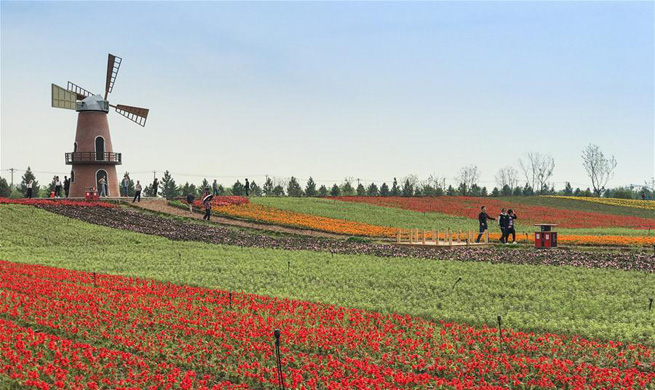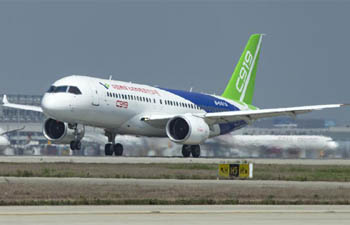UNITED NATIONS, April 27 (Xinhua) -- UN Under-Secretary-General for Humanitarian Affairs Stephen O'Brien on Thursday voiced his grave concern about the intensified fighting in numerous fronts in Syria over last month.
O'Brien, while briefing the UN Security Council on Syria, said that "attacks against medical facilities are completely unacceptable and must stop."
"We await the results of investigations regarding the use of chemical weapons in Khan Shaykhun earlier this month," said O'Brien, who is also the UN emergency relief coordinator.
He said that he is "also gravely concerned" about the situation in besieged eastern Ghouta, outside Syrian capital of Damascus, where the United Nations has been unable to get access to some 400,000 people since last October.
In Raqqa, he said, the situation for people fleeing the fighting who are living in camps is difficult, with four out of five people lacking proper shelter.
Meanwhile, the UN relief chief also cited a number of essential steps for the way forward, including a consolidation of the nationwide ceasefire, and in particular a pause in fighting in eastern Ghouta.
"The Secretary-General has said time and again that there will be no military end to this conflict," he said. "Yet, military might continue to be used against civilians in a way that defies all reason, let alone morality or the law."
He told the 15-nation UN body that that the reported use of "abhorrent chemical weapons" on April 4 in Khan Shaykhun was yet another horrific account of such brutality.
"I wish I could say mindless brutality -- but no, it was deliberate, planned, predetermined, by other humans against their own fellow human beings, sheer unbridled cruelty by leaders and commanders," he said. "And we await the investigation to confirm which ones."
"The humanitarian situation is deteriorating, if that were possible, and the need for active engagement by members of the council is urgently needed," he said.
The core needs of the Syrian people from the international community remain largely unchanged, noting that they include the protection of civilians and civilian infrastructure by all parties to the conflict; immediate, unimpeded and sustained access to all in need throughout Syria; an immediate lifting of all sieges; and a political solution to the conflict.
In besieged eastern Ghouta, outside Damascus, civilians remain trapped amid reports of relentless shelling, airstrikes, and ground fighting, he said, noting that the last informal access routes have reportedly been closed further restricting movement for the some 400,000 people who live in the area, and who the UN has been unable to access since October last year.
As the noose has tightened around eastern Ghouta, some 30,000 people in the adjacent areas of Barza and Qaboun have also come under siege by the government of Syria, he added.
"As it is already too late for the more than a quarter million Syrians who have died already in this atrocious war, so members of the Security Council it is action today that counts," O'Brien stressed, via video link from Geneva, Switzerland.
He also urged the lifting of arbitrary and bureaucratic impediments by all parties throughout Syria.
"I will not repeat again the bureaucratic delaying tactics used by the Government of Syria to thwart humanitarian assistance at every turn, beyond saying that it continues to bring untold human suffering," O'Brien said.
Only four convoys have deployed so far under the new two-monthly April-May plan, reaching 157,500 people. None of these convoys reached besieged areas, due to a lack of necessary authorizations, he said.
Although the overall number of those besieged has been reduced to just over 620,000 people due to evacuations, this process is not in line with humanitarian principles, and not conducted in consultation with the people affected.
he said "many of those who displace to Idlib or northern Aleppo continue to live in areas where civilian structures, including hospitals, come under regular aerial bombardment, and their access to basic goods such as food and shelter is limited."

















